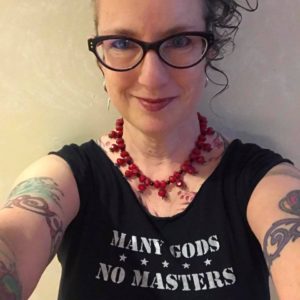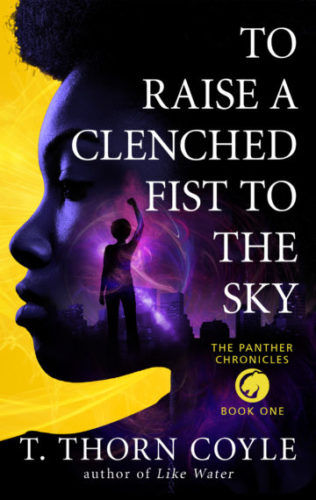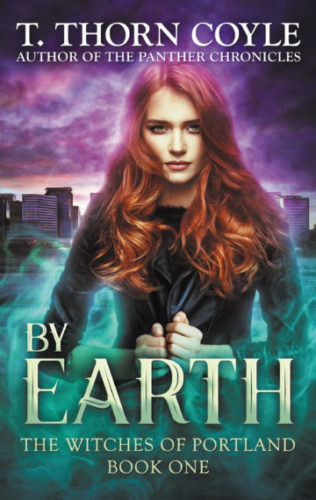[We kicked off our Spring Fund Drive yesterday with no news for the first time in 14 years. Consider joining the TWH sustainers circle and making a small monthly donation to help keep Pagan news and commentary going for years to come, or make a one-time donation toward this vital community media venture. Either way, it is your help and your support that keeps daily and dependable news coming to your doorstep each day. Now we return to your regular news program.]
PORTLAND, Ore. — Four years ago, T. Thorn Coyle was sitting in her home in Berkeley, California, gazing outside at the sycamores swaying in the breeze when she thought, “I hate these trees.”
This is the writer who, in her 2004 book Evolutionary Witchcraft, had proclaimed in its opening paragraph: “In Witchcraft, I found my place in nature, and in nature, I found my connection to all things.”
This is the former Catholic girl who left the church at age 16 to study the Craft, made her way from the Quaker-founded Los Angeles suburb of Whittier to San Francisco, was initiated into Reclaiming, studied with Sufis, studied with Feri tradition founders Victor and Cora Anderson, and then was initiated as a priestess and witch in that tradition in 1996.
This is the Witch/Pagan/magic worker (Coyle identifies as all three) and founder of the Morning Star Mystery School who went on to write Kissing the Limitless: Deep Magic and the Great Work of Transforming Yourself and the World; Make Magic of Your Life: Passion, Purpose, and the Power of Desire; and Sigil Magic for Writers, Artists & Other Creatives.

T. Thorn Coyle [courtesy].
Only, Coyle quickly realized, she didn’t think that.
“That thought that dropped into my head was so clearly not one of my thoughts,” Coyle said during a phone interview from her new home in Portland. “I thought, ‘Wow, I love these trees, and I love the way the sunlight plays on the leaves and the way the wind moves them,’ so I wondered, ‘Well, who is this? Who dropped this thought in my head and why is he sitting here?’”
It was, Coyle said, “my character Jonah who was sitting looking out the window in a deep depression, because his best friend Alex had just been killed by the police.”
After years of writing Craft-y how-to books and other witchy nonfiction, Coyle discovered her muse was dragging her back to the fiction she had dabbled in during her 20s, when she would “spend a year on a short story and not finishing my novel.”
Jonah and Alex became the main characters in Coyle’s first novel, Like Water, which carries the subtitle What Happens When You Die?
“I wrote that because Alex and Jonah — Jonah especially — wanted his story told,” Coyle said. “That brought fiction back to me and I’ve been going gangbusters ever since.”
Coyle no longer spends a year on a single short story while piddling about on an incomplete novel. She has written two short story collections, Break Apart the Stone and Alighting on His Shoulders, each filled with tales of bird women, pookas, faery ice cream vans and other magical beings and mischief. The Panther Chronicles, Coyle’s four-novel, alternative-history fantasy series, tells the adventures of Jasmine Jones, an 18-year-old sorceress who “must shake up the Association of Magical Arts and Sorcery and find her place among the Black Panthers” in 1969 Oakland.
This month Coyle is launching her new fantasy novel series, The Witches of Portland. The first volume, By Earth, is due in late April, and can be pre-ordered in early April on thorncoyle.com. The second and third volumes, By Flame and By Wind, are due in May. Coyle is planning nine books in the series, one for each member of its fictional coven.
On her Patreon page, Coyle writes: “What do I want? To send novels, stories, and essays out into the world that say two things: magic is real. Justice is worth fighting for.”
While fans of Stephen King, Harlan Ellison, Neil Gaiman and other writers believe, in a muggle sort of way, that what their literary heroes do is “magic,” Coyle “absolutely” believes writing is a magical act in the Pagan-witchy sense.
“I am using the symbols that are letters and they form concepts that are words which form larger concepts and I am, with my will and intention, working magic to try to seed thought forms into the world,” Coyle told The Wild Hunt.
The arrival of the tree-hating Jonah, however, has left Coyle with a mystery concerning the whisperings of her muse: did Coyle sense her characters’ arrival was some sort of magical manifestation, or was it just her creative side emerging again?
“That’s a really good question, and it’s a question that’s hard for me to answer,” Coyle said. “The act of writing and the act of characters coming through are so similar to the act of trance work, to acts of aspecting deities, to what some New Age people call trance channeling, but it’s also different, right? . . .
“I’m never sure where the lines are. Alex and Jonah were very real to me. Some characters are that way – they are very, very multidimensional, palpable. It’s clear they have back stories that I don’t even know about, that they have lives. Other characters aren’t as vivid when they show up, so I don’t have a clear answer for that. Part of that is the way our subconscious works is still a mystery. I think our subconscious path gives us larger thought forms than we can rationally explain.”
Coyle also notes that the nature of magic fuels this mystery.
“Magic is an act of co-creation, because through our acts everything around us shifts and the cosmos meets us in various ways,” she said. “Our magic never comes out exactly the way we planned. We’re always co-creating with everything. It’s why we can’t be focused on a goal looking exactly like we wanted when we started, because we change and everything around us changes. Everything else is co-creating with us. It’s the same with any creative process.
“Of course the characters end up with minds of their own and hearts of their own, because we’re co-creating the book.”

Such co-creation played out in an unusual manner when Coyle was writing Like Water and The Panther Chronicles. Alex, one of the main characters in Like Water, is an African-American youth. The four-book Panther Chronicles series centers around 18-year-old Jasmine Jones, a black hereditary sorceress who becomes embroiled in the volatile racial battles of late 1960s America.
Coyle is white. Fans of literary history will know that white writers don’t often make their main characters black – even if that Mark Twain fellow did so with his portrayal of the runaway slave Jim in what many scholars consider to be the greatest of American novels, Huckleberry Finn.
“I almost stopped writing The Panther Chronicles multiple times because I’m not just writing a black character – I’m writing a black character who was a member of one of the most powerful black organizations in recent history, the Black Panther party,” Coyle said, “so I did hesitate.”
The genesis of the series came when Coyle was taking a fiction writing intensive, and workshop participants were assigned to write a piece of historical fiction that was due the next day.
Living in the Bay Area, Coyle “was immersed in Oakland, California politics, and of course Oakland is the birthplace of the [Black] Panthers,” she said. “I was doing a lot of social justice work in Oakland and Berkeley, and I also did a ton of research” on members of that group.
Coyle was captivated by the tragic story of Fred Hampton, an activist and chairman of the Illinois chapter of the Black Panther party. Hampton was killed in 1969 during a raid by Chicago-area authorities in conjunction with Chicago police and the FBI.
“I have always had the question in the back of my mind: ‘What would have happened if Fred Hampton had not been assassinated?’” Coyle said. “It would have changed the course of history because he was so powerful, so intelligent, so charismatic, and that was why he was assassinated. [FBI director J. Edgar] Hoover actually said we need to take out every charismatic black leader, so I always had that question.”
For that workshop assignment, Coyle wrote a 7,000-word short story about Jasmine Jones, the young black sorceress. Then, Coyle said, she “avoided it for quite a while, but the story kept coming back to me.”
She turned the story into a novel. She received a “tremendous” response from two African-American women who she asked to read the draft, and they encouraged her to write more of Jasmine’s story.
Coyle was still hesitant. She knew that readers, especially African-American readers, might protest that, as a white person, she had no right to pretend to know what it’s like to be black.
“I was prepared for that, but I kept writing despite my hesitation,” Coyle said. “I realized with our political situation the way it is, these stories need to be out there. I tried to do it with as much depth, compassion and respect as possible, and that’s all we can do. The response I’ve gotten from African-American readers has been great. The only complaints I’ve gotten have been from two white people, and neither of them have read the books.”

The inspiration for her soon-to-be-released series, The Witches of Portland, was as dramatic in a different way. For years Coyle has been battling health issues that only recently were diagnosed as a combination of hypothyroidism and vitamin D deficiency.
“Last year I was so brain-fogged and exhausted that all I could do work-wise was lie on the couch and watch videos by other writers,” Coyle said. In one video, successful romance writers spoke about their approach of having a group of recurring characters, with one character becoming the main voice in any one novel.
“They’re linked standalone novels,” Coyle said. “You don’t have to do a big story arc like I did with The Panther Chronicles. I was in this horrible, exhaustive brain fog, and I thought, ‘Oh, I could have this nine-person coven and all of them appear in every novel, but each novel is focused on a different coven member.’
“These different characters started coming to me, some of them really strongly right out of the gate. Others I am getting to know as I write the novels. I’m excited about this series. I’ve written the first three, I’m currently in the middle of writing book four, and I’m going to keep on going until all nine of them are out in the world.”
These days, Coyle admits, her magical practice “is less formal now than it was for awhile. I still have a strong daily practice. I honor my ancestors every day. I honor the gods and goddesses. I make sure to spend time in nature. I still do a lot of sigil magic and other operative magic as well, but it’s more integrated into my life these days and less of a formal practice.”
Such integration comes into focus when one recalls Coyle’s belief that writing itself is a magical act.
Her practice of the magical art of writing has shape-shifted as well. While Coyle is planning to release a book-length collection of her social justice and political-oriented essays from the last three years, she currently has no plans to return to book-length nonfiction works of the sort that have landed her high on the radar of the Pagan/magical community for more than a decade.
“Fiction is a great way to shift consciousness,” Coyle said. “People are storytellers. We always have been. I think we communicate best through story because it engages so many more parts of ourselves than nonfiction and strictly intellectual writing. It engages our emotions more easily. It engages our senses more easily. That’s a key to shifting consciousness right off the bat.
“Story is powerful, and it’s also easier for me through fiction to relate a bunch of magical concepts without having to explain this is actually real in these exact ways. There’s a suspension of disbelief that already happens when we enter story. I can communicate magical and spiritual concepts without having to prove anything to anyone.”

Save Pagan journalism
Donate today
The Wild Hunt is not responsible for links to external content.
To join a conversation on this post:
Visit our The Wild Hunt subreddit! Point your favorite browser to https://www.reddit.com/r/The_Wild_Hunt_News/, then click “JOIN”. Make sure to click the bell, too, to be notified of new articles posted to our subreddit.
Pingback: The Wild Hunt